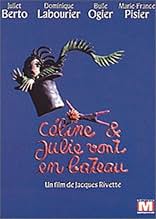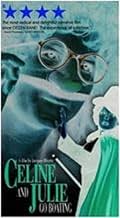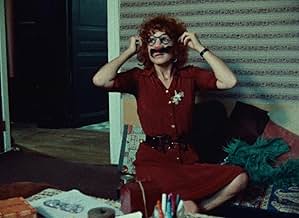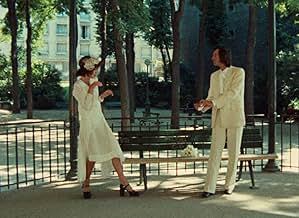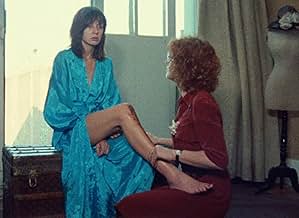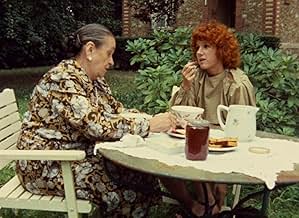Céline et Julie vont en bateau
Original title: Céline et Julie vont en bateau : Phantom Ladies Over Paris
- 1974
- Tous publics
- 3h 13m
IMDb RATING
7.2/10
6.8K
YOUR RATING
A mysteriously linked pair of young women find their daily lives preempted by a strange boudoir melodrama that plays itself out in a hallucinatory parallel reality.A mysteriously linked pair of young women find their daily lives preempted by a strange boudoir melodrama that plays itself out in a hallucinatory parallel reality.A mysteriously linked pair of young women find their daily lives preempted by a strange boudoir melodrama that plays itself out in a hallucinatory parallel reality.
- Awards
- 1 win total
Jean-Claude Biette
- Spectateur au cabaret
- (uncredited)
Jacques Bontemps
- Lecteur à la bibliothèque
- (uncredited)
Michel Caen
- Spectateur au cabaret
- (uncredited)
Featured reviews
Praised by the critics as "delicate , mysterious, and exiting", "an original and entertaining metaphor for film-watching and, perhaps, film history", and named "The most radical and delightful narrative film since Citizen Kane! The experience of a lifetime" by New York's critic David Thompson, "Celine and Julie Go Boating" (1974) is all of the above but first of all it is incredible fun to watch. This magic candy of a movie tells the story (or rather plays with the story) of two friends, Julie, a librarian and Celine, a magician. The film starts one sunny summer day in Paris when Julie follows running through the park and losing her stuff all over (a scarf, a shoe
) Celine exactly like another girl in the English country side one sunny summer day had followed a White Rabbit into a world of her imagination. Two girls became friends and soon with the help of a magic memory-inducing candy, they both will be the observers and participants in a bizarre soap-opera like drama that takes place in a mysterious house. It involves two stunningly beautiful women, a blonde and a brunette, who are in love with the same man. The man is a widower with a young daughter who had promised his wife that he would not remarry as long as their daughter is alive. When the blonde and the brunette become desperate enough to try to do something about the situation, it is up to Julie and Celine to come up with the plan and to rescue the young girl. Will they go boating? Well, you will have to stay with them for all 193 minutes to find out. Yes, Rivette takes his time but his movie never seems slow or boring. Playful yet complicated, mad and funny, "Celine and Julie" is a magic movie. It grabbed me from the opening scene - which is of course the opening chapter of "Alice in Wonderland" - and it never let go. Buniel would love this movie, I think. It also reminds me of "Mullholand Dr" and even "Persona" but in the absolutely different mode. Simply DELIGHTFUL.
Last year, at a crisis time of imminent homelessness, I went to the video store with the idea of renting some banal new release to distract me from my troubles. Waiting in line holding a video starring Tom Hanks (or was it Kevin Costner? Maybe it was Julia Roberts. Such a blur is Hollywood today) something in the foreign section an aisle down caught my eye. It was the video for Jacques Rivette's 1974 masterpiece, Celine and Julie Go Boating.
Immediately upon seeing the cover image of Juliet Berto (Celine) posed as a magician, her Dietrich hauteur kinky and comical, I knew it would be my kind of film. I was also pleased to see it was such a long film it had to be contained in a two-video set. It had long been my suspicion that all secrets of life would be revealed in a film over three hours long and in French.
Indeed, Celine and Julie is just that film. But it conceals as it reveals, which is to say that its great mysteriousness results from its floribundance of revelation. Yes, my friend, a floribundance! I never even thought of such a word until seeing Celine and Julie.
Critics have been unable to explain what it's "about". I cannot. I can't explain the plays of Shakespeare or the poems of Emily Dickinson, but I am moved by them. Attempts to understand them can lead to intense mental spasmodics, but the pain, if the work is good, can be great.
Those who've seen the film will remember the hard magic candy the women savored on their own path to understanding. Vision giving, the candy became an addiction to them. Once is never enough and hasn't been for me. I have seen Celine and Julie three times and thought of it many more.
My favorite scene is where Celine performs her weird magic act in a nightclub where, as far as I can tell, the customers are all convicted poets. The atmosphere there is fascinating. Time stops while she does her act, which is beyond words, indescribable. The whole feeling in that scene of a kind of super sophisticated moment of comedy and sex and mystery all shared by a group of people in silence is one that I find marvelously inspiring. Surely some clever entrepreneur in San Francisco, where I reside, could open such a club. Oh, I suppose it won't happen, but at least one can dream.
Really, it's the importance, power and pleasure-pain of dreaming that this film reawakended me to when I saw it months ago. To be like Celine and Julie with their minds moved by candy is a state I aspire to daily.
When I was briefly without a place to live, I thought of this film and was taken to a sunny day in Montmarte, a house where the living and unliving mingle, a library where stalkers and smokers meet. I savored that magic, the effect of great art on the mind, and I knew I was not truly homeless.
Immediately upon seeing the cover image of Juliet Berto (Celine) posed as a magician, her Dietrich hauteur kinky and comical, I knew it would be my kind of film. I was also pleased to see it was such a long film it had to be contained in a two-video set. It had long been my suspicion that all secrets of life would be revealed in a film over three hours long and in French.
Indeed, Celine and Julie is just that film. But it conceals as it reveals, which is to say that its great mysteriousness results from its floribundance of revelation. Yes, my friend, a floribundance! I never even thought of such a word until seeing Celine and Julie.
Critics have been unable to explain what it's "about". I cannot. I can't explain the plays of Shakespeare or the poems of Emily Dickinson, but I am moved by them. Attempts to understand them can lead to intense mental spasmodics, but the pain, if the work is good, can be great.
Those who've seen the film will remember the hard magic candy the women savored on their own path to understanding. Vision giving, the candy became an addiction to them. Once is never enough and hasn't been for me. I have seen Celine and Julie three times and thought of it many more.
My favorite scene is where Celine performs her weird magic act in a nightclub where, as far as I can tell, the customers are all convicted poets. The atmosphere there is fascinating. Time stops while she does her act, which is beyond words, indescribable. The whole feeling in that scene of a kind of super sophisticated moment of comedy and sex and mystery all shared by a group of people in silence is one that I find marvelously inspiring. Surely some clever entrepreneur in San Francisco, where I reside, could open such a club. Oh, I suppose it won't happen, but at least one can dream.
Really, it's the importance, power and pleasure-pain of dreaming that this film reawakended me to when I saw it months ago. To be like Celine and Julie with their minds moved by candy is a state I aspire to daily.
When I was briefly without a place to live, I thought of this film and was taken to a sunny day in Montmarte, a house where the living and unliving mingle, a library where stalkers and smokers meet. I savored that magic, the effect of great art on the mind, and I knew I was not truly homeless.
10EdgarST
I saw "Céline et Julie vont en bateau" a few years after watching "3 Women" and Claudia Weill's "Girlfriends." The next day I saw it again, and then again and again... This was a time when I was very interested in the depiction of modern women in films: some were quite original and revealing, and this was indeed one of them, dealing with the creative process, and women's imagination. Made in 1974, it had a similar origin as that of "3 Women", in which the female cast (Juliet Berto, Dominique Labourier, Bulle Ogier, and Marie-France Pisier) worked with director Rivette and writer Eduardo de Gregorio on the script. It is also a story of female bonding and solidarity, but instead of relying on dreams, it uses magic and literary sources, Lewis Carroll's "Alice in Wonderland" being the first to come to mind. Librarian Julie (Labourier) becomes intrigued by weird rabbit-like magician Céline (Berto), but soon one is after the other. They become friends (or sort of) and exchange roles in each other's life, but nobody seems to notice the difference. Then Céline reveals she frequently goes inside an old house where a melodrama is repeated on and on (based on Henry James' "The Romance of Certain Old Clothes" and "The Other House"), enacted by two women (Ogier, Pisier) who are both in love with a very pale man (filmmaker Barbet Schroeder.) In the old house there is also a little girl (Nathalie Asnar) who is in danger, so Céline and Julie become the "phantom ladies" of the title (including Fantômas outfits) to rescue her. This post-modern movie is a puzzle, and the audience is intellectually involved in the making. Critics went crazy and called it "the most important film made since 'Citizen Kane'." I don't know if it is, but I love it: it is funny, demanding, entertaining, and sometimes boring, in the best tradition of Satie's repetitive "Vexations". Reworked as "Desperately Seeking Susan", without acknowledging it.
Some directors use less than 2% of their footage in the final cut but Rivette must have used 92% of his to make this - perhaps he used absolutely everything, including, apparently, out-takes. Tedium sometimes has a point, but not here. This is annoying-tedium for every scene seems calculated to test our patience. There's no humour or verve or flair or great lines or classic scenes, not even sad attempts at those things, only a forced drollerie that falls flat in every scene There is endless silly giggling, scenes such as those in the nightclub that are just tiresome to watch, fantasy sequences that are presumably meant to look like a corny TV sitcom, but, lacking any scrap of humour, the point is entirely lost and the actors flounder. The girls try far too hard to be cute, and only succeed in being cloying. And I'm waiting for a director to grasp this simple truth: that giving the actors free rein does not make the action more spontaneous and natural, only more strangulated, more self-conscious, more unnatural and cringe-inducing than if they were following a consistent and meticulous script.
After a while you realise Rivette is just playing silly buggers. Fluffed lines are left in, characters glance inadvertently-deliberately at the camera. Rivette will be saying: 'Regard, c'est un film that is pas un film, we're deliberatement toying avec your illusions'. I'm saying: Vous etes un wankeur.
Why three hours? A Senses of Cinema article is eager to explain: 'The tradition of rigid adherence to the 90 minute to 2-hour time frame, enforced by the laws of free market capitalism, is exploded by Rivette. As a filmmaker, Rivette refuses to confine himself to these arbitrary lengths, or to the even more arbitrary, if unspoken, rules about demands on subject matter and mise-en-scène in films of epic length. Instead, Rivette extends the lengths of his films to a point beyond necessity, where it is understood that the film's length in and of itself is a statement about the system he works in and rebels against.' 3 hours simply to defy (capitalistic??) convention? Wankeur.
The audience are the dupes here - poked fun at for trying to apply reality to what is self-consciously only a film. This is not New Wave. I'm gazetting Rivette as a hanger-on, a copyist. He wants to shoot in the style of Rohmer, but he hasn't got Rohmer's indefinable deftness. He wants to break the rules like Godard but he has not got Godard's indefinable style or charisma. He wants to say something meaningful in an offhand way, like Truffaut, but he hasn't got that indefinable intellect for it. All he can do is try. You can feel him trying. It boils down to a single lame joke that isn't funny and a single idea that isn't clever. Three hours of film-flam, tiresome beyond belief.
After a while you realise Rivette is just playing silly buggers. Fluffed lines are left in, characters glance inadvertently-deliberately at the camera. Rivette will be saying: 'Regard, c'est un film that is pas un film, we're deliberatement toying avec your illusions'. I'm saying: Vous etes un wankeur.
Why three hours? A Senses of Cinema article is eager to explain: 'The tradition of rigid adherence to the 90 minute to 2-hour time frame, enforced by the laws of free market capitalism, is exploded by Rivette. As a filmmaker, Rivette refuses to confine himself to these arbitrary lengths, or to the even more arbitrary, if unspoken, rules about demands on subject matter and mise-en-scène in films of epic length. Instead, Rivette extends the lengths of his films to a point beyond necessity, where it is understood that the film's length in and of itself is a statement about the system he works in and rebels against.' 3 hours simply to defy (capitalistic??) convention? Wankeur.
The audience are the dupes here - poked fun at for trying to apply reality to what is self-consciously only a film. This is not New Wave. I'm gazetting Rivette as a hanger-on, a copyist. He wants to shoot in the style of Rohmer, but he hasn't got Rohmer's indefinable deftness. He wants to break the rules like Godard but he has not got Godard's indefinable style or charisma. He wants to say something meaningful in an offhand way, like Truffaut, but he hasn't got that indefinable intellect for it. All he can do is try. You can feel him trying. It boils down to a single lame joke that isn't funny and a single idea that isn't clever. Three hours of film-flam, tiresome beyond belief.
10Corwin-3
Movies would seem to be the ideal medium for surrealism, yet there are almost no good surrealist movies. There is the venerable "Un Chien Andalou", and there is "Celine et Julie vont en Bateau", and that might well be the lot. "Celine et Julie" has been one of my favorite films since I first saw it in the 1970s, because it is hypnotic, thought-provoking, mysterious, and funny, all at once. Its overall style could be described as magical realism, in which the quotidian life of Paris serves as a mere background for the magical fantasy life of the protagonists, two young women on a psychic journey, which may or may not end in madness ("vont en bateau", which literally means "go boating", is also slang for "go crazy").
The film is made of moments that seem to happen outside of time. In fact, the passage of time, the succession of events in everyday life, becomes an intrusion on the increasingly shared inner life of the two women, and each takes (hilarious) action to prevent those intrusions from continuing. They determine, in effect, that they must return as adults to their childhood in order to change the past. This may sound like a boring Freudian nightmare, but there is no heavy-handed psychologizing in the movie; it is all play, lighthearted yet beautifully composed. The sound-track is particularly effective, almost hyperrealistic, with no background music. The click of heels on pavement, or the motor of a taxi, loom out of the silence as in a dream, which the movie may be, at its heart.
I give this one a 10. You probably know already whether you would like it. If so, see it in a theater if you can, and on video if you must, but don't miss it.
The film is made of moments that seem to happen outside of time. In fact, the passage of time, the succession of events in everyday life, becomes an intrusion on the increasingly shared inner life of the two women, and each takes (hilarious) action to prevent those intrusions from continuing. They determine, in effect, that they must return as adults to their childhood in order to change the past. This may sound like a boring Freudian nightmare, but there is no heavy-handed psychologizing in the movie; it is all play, lighthearted yet beautifully composed. The sound-track is particularly effective, almost hyperrealistic, with no background music. The click of heels on pavement, or the motor of a taxi, loom out of the silence as in a dream, which the movie may be, at its heart.
I give this one a 10. You probably know already whether you would like it. If so, see it in a theater if you can, and on video if you must, but don't miss it.
Did you know
- TriviaIt is a misconception that most of the film was improvised by the actors. Jacques Rivette provided structure but did not let his actors "go wild", instead he let them write. A single scene was improvised, where Celine, played by Julie Berto, brags to her associates about her rich American friend. The rest of the scenes where shot from scripted material, mostly thanks to participating actors. The film is collaboration by several authors, including actors Berto, Labourier, Ogier and Pisier. Rivette's involvement in the writing was to give structure to all the contributions, tightening things up.
- GoofsThe last time Julie receives the cigarette from under the table, it is bigger than it was when her colleague handed it to her.
- ConnectionsFeatured in Berlin Chamissoplatz (1980)
- How long is Celine and Julie Go Boating?Powered by Alexa
Details
Box office
- Gross US & Canada
- $31,452
- Opening weekend US & Canada
- $5,624
- May 6, 2012
- Gross worldwide
- $31,452
- Runtime
- 3h 13m(193 min)
- Sound mix
- Aspect ratio
- 1.37 : 1
Contribute to this page
Suggest an edit or add missing content


